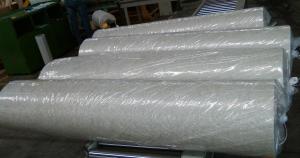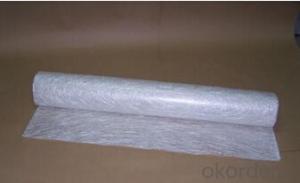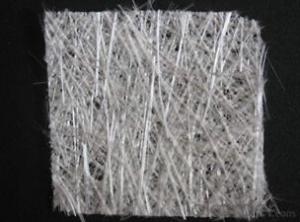E-glass Fiberglass Chopped Strand Mat Powder Binder
- Loading Port:
- China Main Port
- Payment Terms:
- TT or LC
- Min Order Qty:
- 1 PALLETS kg
- Supply Capability:
- 300000 kg/month
OKorder Service Pledge
OKorder Financial Service
You Might Also Like
Product description of Fiber Glass Powder Binder Chopped Strand Mat
Glass Fiber Powder Binder Chopped Strand Mat is an unwoven fabrics consisting of randomly distributed chopped strands held together with powder binder.
Powder Chopped Strand Mats are compatible with unsaturated polyester, vinyl ester, phenolic and epoxy resins.
The products are widely used in hand lay-up process and can also be used in compression molding and continuous laminating process and fixed table laminating process. The typical end-use applications include various panels, boats, bathroom accessories, automotive parts and cooling towers.
Specification of E-Glass Chopped Strand Mat
Property | Glass type | Weight(g/m2) | Width 200~3300 | Roll Weight | Moisture Content% | Combustible Content% | Breakage Strength N |
Test Method | GB/T 1549 | ISO3374:2000 | ISO3374 | GB/T17470-1998 | ISO3344:1997 | ISO1887:1995 | ISO3342 |
EMC 80 | E-GLASS | 80±16 | ±5 | 6~50 | <0.2 | 13.6±0.35 | ≥200 |
EMC 100 | E-GLASS | 100±10 | ±5 | 6~65 | <0.2 | 9.5±0.35 | ≥170 |
EMC 150 | E-GLASS | 150±15 | ±5 | 6~97 | <0.2 | 8.0±0.35 | ≥40 |
EMC 225 | E-GLASS | 225±22 | ±5 | 6~150 | <0.2 | 5.0±0.6 | ≥60 |
EMC 300 | E-GLASS | 300±30 | ±5 | 6~180 | <0.2 | 4.0±0.6 | ≥90 |
EMC 450 | E-GLASS | 450±45 | ±5 | 6~180 | <0.2 | 3.8±0.6 | ≥120 |
EMC 600 | E-GLASS | 600±60 | ±5 | 6~240 | <0.2 | 3.6±0.6 | ≥150 |
EMC 900 | E-GLASS | 900±90 | ±5 | 6~190 | <0.2 | 3.4±0.6 | ≥180 |
Characteristics of Chopped strand mat
1.Uniform density ensures consisttent fiberglass content and mechanical properties of the composites products;
2.Uniform powder distribution ensures good mat integrity, little loose fibers and small roll diameter;
3.Excellent flexibility ensures good moldability with no spring back at sharp angles;
4.Fast and consistent wet-out speed in resins and rapid air lease reduce resin consumption and production cost, and enhances productivity and mechanical properties of the end products.
5, The composite products have high dry and wet tensile strength and good transparency.
6, Optional for high strength with stiff mat for panel laminating and midle strength with soft mat for hand layup.
Package:
1, the Mat roll will be wrapped in PVC/PE film, then packed with carton boxes;
2, Vertically placed on bottom pallets by:
4 rolls*4 rolls or 4 rolls* 5rolls
Horizontally placed on upper pallets by:
3 rolls*4 rolls
3, the whole pallet will be fasten by PVC strips;
4, the whole pallets will be wrapped by strentchable PE film.
FAQ:
1. Why Choose us?
CNBM is a stated own company, provide the guarantee for the best quality, best service and safety business.
2. How will we guarantee the quality?
a, ISO 9001-2008 quality control system;
b, Strict and regular quality control in production;
c, Inspeciation when loading into container before shippment;
d, Sample stock for one year for quality tracing and record.
3. What is your MOQ?
Our MOQ is one pallet.
4. Can you provide sample?
Yes, samples are in stock. we can offer free sample for you.
5. Payment terms?
We can accept L/C, T/T etc.
6. Do you offer OEM service?
Yes, we can print customers’ logo on the packaging;
And the size and specification can be produced and design according to your demand.
7. What is the Production Lead Time?
1 *40HQ each day.
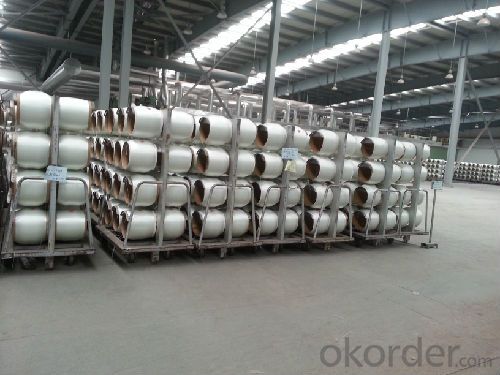
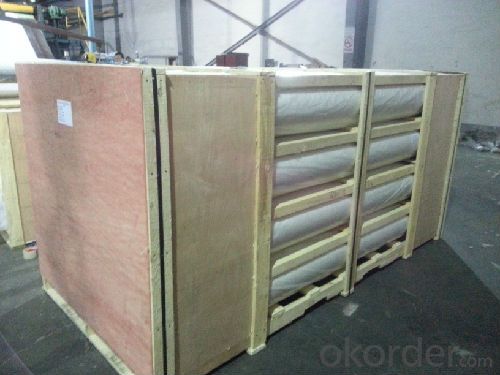
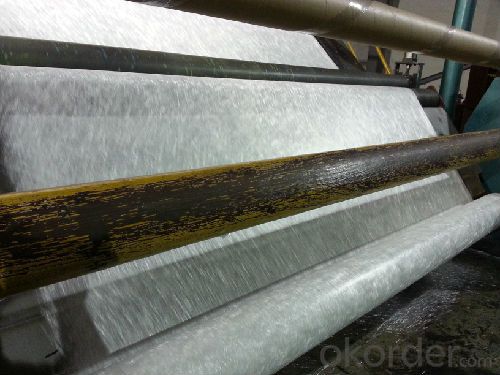
- Q:Is fiberglass mat tissue suitable for soundproofing?
- Yes, fiberglass mat tissue is suitable for soundproofing. It is an effective material for absorbing and dampening sound waves, making it a popular choice for soundproofing applications in buildings, vehicles, and other structures.
- Q:How does the density of fiberglass mat tissue impact its performance?
- The performance of fiberglass mat tissue is significantly impacted by its density. This nonwoven material is made up of glass fibers that are randomly dispersed and held together by a binder. Density refers to the number of fibers present in a given volume of the material. Increased density of fiberglass mat tissue generally leads to enhanced mechanical properties and performance. The higher density means there are more glass fibers in each unit volume, resulting in improved strength, stiffness, and durability. This makes the material more resistant to tearing, puncturing, and abrasion, which is especially important in applications where the tissue is exposed to harsh conditions or heavy loads. Furthermore, higher-density fiberglass mat tissue offers superior thermal insulation properties. The increased fiber content allows for better heat resistance, making it suitable for applications that require thermal protection, such as insulation boards or fireproofing materials. Conversely, lower density of fiberglass mat tissue can offer advantages in certain applications. Lower-density tissues are generally more flexible and have better conformability, allowing them to easily adapt to irregular surfaces or complex shapes. This makes them suitable for applications where flexibility or conformability is a primary requirement, such as in the automotive or aerospace industries. In conclusion, the density of fiberglass mat tissue is critically important in determining its performance characteristics. Whether a higher or lower density is preferred depends on the specific requirements of the application, taking into account factors such as strength, stiffness, durability, thermal insulation, flexibility, and conformability.
- Q:What are the different quality standards for fiberglass mat tissue?
- Various quality standards are utilized to evaluate the quality of fiberglass mat tissue, ensuring its suitability for intended applications and meeting performance requirements. The ASTM D2178 standard is widely used to assess the quality of fiberglass mat tissue. This standard outlines the specifications for base materials used in the production of asphalt and coal tar roofing products. It covers physical properties such as weight, thickness, tensile strength, tear resistance, and permeability. Another recognized standard is ISO 3376, which provides guidelines for determining the tensile properties of nonmetallic materials, including fiberglass mat tissue. It defines test methods for parameters like tensile strength, elongation at break, and modulus of elasticity. In Europe, the EN 1871 standard is commonly used for assessing the quality of fiberglass mat tissue. This standard specifies the requirements for reinforced bitumen sheets used in roofing applications. It covers physical properties, dimensional stability, resistance to heat, and resistance to aging. Furthermore, there are industry-specific quality standards that may apply to fiberglass mat tissue used in particular applications. For instance, the ASTM C1666 standard specifically addresses fiberglass reinforced cementitious panels and sets requirements for the materials used in their production. Overall, these various quality standards for fiberglass mat tissue ensure that it meets specific performance criteria and can be effectively utilized in applications such as roofing, construction, and insulation. They establish a framework for manufacturers, suppliers, and customers to assess and compare the quality of different products in the market.
- Q:What is the flexibility of fiberglass mat tissue at low temperatures?
- The flexibility of fiberglass mat tissue at low temperatures is generally maintained, as fiberglass has low thermal expansion and contraction properties, allowing it to retain its flexibility even in cold conditions.
- Q:What are the advantages of using fiberglass mat tissue in construction?
- There are several advantages of using fiberglass mat tissue in construction. Firstly, it provides excellent strength and durability, making it highly resistant to impacts and weather conditions. Additionally, it has a high tensile strength, allowing it to withstand heavy loads without deformation. Fiberglass mat tissue is also lightweight, making it easier to handle and transport. Moreover, it is non-combustible and provides good thermal insulation properties, enhancing the overall safety and energy efficiency of the construction. Lastly, fiberglass mat tissue is cost-effective, as it requires minimal maintenance and has a long lifespan, reducing the need for frequent replacements.
- Q:What are the advantages of using fiberglass mat tissue?
- Fiberglass mat tissue offers several benefits when utilized in different applications. To begin with, its lightweight composition allows for easy handling and transportation, making it a practical option for the construction and manufacturing sectors. Moreover, fiberglass mat tissue boasts exceptional strength and durability. Its high tensile strength enables it to withstand heavy loads and resist tearing or breaking, making it an ideal choice for reinforcing structures and ensuring structural integrity. In addition, fiberglass mat tissue exhibits a high level of resistance to corrosion, chemicals, and weathering. It remains unaffected by rust, rot, or degradation when exposed to harsh environmental conditions, thereby making it perfectly suited for outdoor use. Furthermore, the versatility of fiberglass mat tissue is worth noting. It can be effortlessly molded into various shapes and sizes, rendering it suitable for a wide array of applications. Whether it is employed in the construction sector, automotive industry, or even for boat hulls, fiberglass mat tissue can be tailored to meet specific design requirements. Furthermore, fiberglass mat tissue serves as an excellent thermal insulator. It effectively traps heat, resulting in energy efficiency and cost-effectiveness when utilized for insulation purposes. This can contribute to reduced energy consumption and lower heating or cooling costs in buildings. Lastly, fiberglass mat tissue is highly fire-resistant. Its resistance to ignition and ability to withstand high temperatures without melting or releasing toxic fumes make it a safe option for applications where fire safety is a concern, such as in the construction of fire-resistant doors or insulation materials. In conclusion, the advantages of using fiberglass mat tissue include its lightweight nature, strength and durability, resistance to corrosion and weathering, design versatility, thermal insulation properties, and fire resistance. These attributes make it an exceedingly desirable material in various industries and applications.
- Q:Can fiberglass mat tissue be used for waterproofing?
- Indeed, fiberglass mat tissue has the potential to be utilized for waterproofing purposes. This particular material, comprised of fiberglass fibers, takes the form of a thin, non-woven substance. Its primary function lies in the reinforcement and provision of waterproofing attributes within the realm of construction and building applications. When combined with a waterproofing agent or resin, the fiberglass mat tissue can establish an impermeable barrier, effectively impeding the infiltration of water or moisture. Consequently, it proves to be a highly advantageous option for various undertakings such as roofing, basement waterproofing, and the installation of bathrooms or showers. Furthermore, the robustness and enduring nature of fiberglass mat tissue contribute to its resistance against cracks or tears, guaranteeing the longevity of its waterproofing capabilities.
- Q:What is the thermal conductivity of fiberglass mat tissue?
- The thermal conductivity of fiberglass mat tissue is typically low, ranging from 0.03 to 0.05 W/m·K. This means that fiberglass mat tissue is a good insulator and can effectively resist the transfer of heat. Its low thermal conductivity makes it suitable for applications such as thermal insulation in buildings, industrial equipment, and appliances.
- Q:How does fiberglass mat tissue perform in terms of moisture absorption?
- Fiberglass mat tissue performs exceptionally well in terms of moisture absorption. Due to its composition of fine fibers, it has a high surface area which enables it to quickly absorb moisture. Additionally, fiberglass mat tissue is hydrophobic, meaning it repels water and does not retain moisture for extended periods. This characteristic makes it an ideal material for applications where moisture resistance is crucial, such as in the construction of waterproofing membranes or in the manufacturing of boats and water tanks. Overall, fiberglass mat tissue demonstrates excellent performance in preventing moisture absorption and maintaining its structural integrity even in wet environments.
- Q:Is fiberglass mat tissue resistant to mildew and rot?
- Indeed, the resistance of fiberglass mat tissue to mildew and rot is undeniable. Crafted from delicate glass fibers interlaced to form a robust and enduring substance, fiberglass stands as a paragon. Its non-porous nature prevents moisture absorption, thus endowing fiberglass mat tissue with exceptional resistance against mildew proliferation and rot-induced decomposition. Moreover, fiberglass often receives protective coatings or additives that amplify its fortitude against these biological detriments. For this reason, fiberglass mat tissue emerges as an exemplary selection in settings where humidity or moisture pose a threat, such as bathrooms, outdoor structures, or regions prone to elevated humidity levels.
1. Manufacturer Overview |
|
|---|---|
| Location | |
| Year Established | |
| Annual Output Value | |
| Main Markets | |
| Company Certifications | |
2. Manufacturer Certificates |
|
|---|---|
| a) Certification Name | |
| Range | |
| Reference | |
| Validity Period | |
3. Manufacturer Capability |
|
|---|---|
| a)Trade Capacity | |
| Nearest Port | |
| Export Percentage | |
| No.of Employees in Trade Department | |
| Language Spoken: | |
| b)Factory Information | |
| Factory Size: | |
| No. of Production Lines | |
| Contract Manufacturing | |
| Product Price Range | |
Send your message to us
E-glass Fiberglass Chopped Strand Mat Powder Binder
- Loading Port:
- China Main Port
- Payment Terms:
- TT or LC
- Min Order Qty:
- 1 PALLETS kg
- Supply Capability:
- 300000 kg/month
OKorder Service Pledge
OKorder Financial Service
Similar products
New products
Hot products
Related keywords
